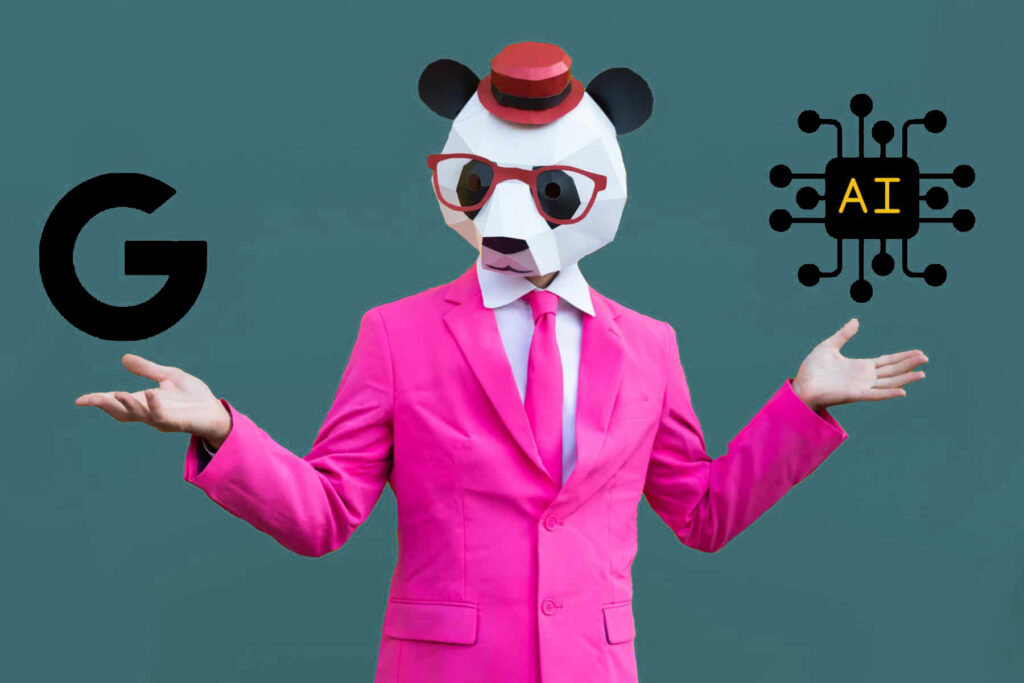What Does Google Think Of AI?

What Does Google Think Of AI?
When it comes to AI-generated content and SEO, what does Google think? This is a hot topic these days, especially for businesses trying to stay competitive online. With advances in Artificial Intelligence and tools like Meta AI, ChatGPT, Claude AI and Google Gemini, it’s a game-changer in the world of content creation. However, the pressing question is whether Google penalizes such content or embraces it.
Understanding AI-Generated Content
AI-generated content is text created by artificial intelligence algorithms powered by machine learning technology. These algorithms can produce anything from blog posts and articles to social media updates and product descriptions. AI tools have become incredibly sophisticated, making it extremely difficult to distinguish between human-written and AI-generated content.
Google's Approach To AI-Generated Content
Google’s primary aim has always been to deliver the most relevant and high-quality search results to its users. When it comes to AI-generated content, Google doesn't outright penalize it just for being machine-produced. However, the quality and relevance of the content are scrutinized.
3 Crucial Points To Wrap Your Head Around
- Google’s Search Algorithms: These algorithms are designed to identify the relevance and quality of the content. Google AI plays a significant role in ensuring that only the most helpful content ranks high in search results.
- Quality Over Source: Google isn't as concerned about how the content is generated. Whether it’s from a professional writer or an AI, the focus is on quality. Poor quality content, regardless of the source, will likely get flagged.
- SEO Considerations: AI-generated content that follows good SEO practices and adheres to Google’s guidelines can perform well. It’s all about how you use it.
Google's Policies On AI-Generated Content
Google has laid out specific policies to ensure content quality and user satisfaction. Their stance on AI-generated content is no different. They’re not opposed to it per se, but certain conditions must be met.
Google’s Spam Policies
Google’s spam policies are crafted to ensure that search results stay squeaky clean and trustworthy. These guidelines are all about keeping low-quality, deceptive, and manipulative content at bay. Think of Google as a bouncer at an exclusive club—it won’t let just any shady character in.
By booting out spammy content, Google makes sure that when you search for something, you’re getting the real deal: relevant, high-quality information. Who wants to sift through garbage anyway? Stick with what’s legit, and Google’s not going to choke on it.
- Manipulative Practices: Any attempts to manipulate search rankings through content automation could trigger penalties.
- Keyword Stuffing: Overstuffing keywords is a big no-no. Even AI-generated content must avoid this.
- Irrelevant Content: Content that doesn’t provide value or is off-topic will be frowned upon.
Will Google Penalize AI-generated Content?
As long as the content meets quality standards and isn’t manipulating search rankings, Google isn’t likely to penalize it just because it’s AI-generated. Quality AI content will not harm your SEO strategy if the copy is highly relevant to the search intent and answers a user's query better than competitors - it should not be a rehash of low-quality reworded content. The days of exact-match keyword stuffed copy should now be behind us.
Search Rankings & Content Quality
Search rankings are determined by how well content serves user intent. This means AI-generated content must be high-quality, relevant, and engaging.
Factors Affecting Search Rankings
- Relevance: Content must directly address the search query and offer useful information.
- Engagement: Higher engagement rates, like longer dwell time and lower bounce rates, are positive signals for search rankings.
- Authority: Building domain authority through backlinks and other SEO practices can improve search rankings.
If AI-generated content ticks all these boxes, there’s no reason it can’t perform well in search rankings.
Addressing Concerns: Poor Quality Content
One of the biggest concerns with AI-generated content is the risk of producing low-quality content. Google’s algorithms are adept at picking up signals that indicate poor quality.
Characteristics Of Poor Quality Content
- Lack Of Originality: Content that’s overly generic or lacks a unique perspective.
- Errors & Inconsistencies: Grammatical errors, factual inaccuracies, and inconsistency can be detrimental.
- Thin Content: Content that lacks depth or fails to offer substantial information.
Businesses need to ensure that their AI-generated content doesn’t fall into these traps.
How Can I Ensure My AI-generated Content Is High-quality?
Always review and human edit AI-generated content. Incorporate input from professional copywriters and ensure it’s accurate, relevant, and engaging.
Google's AI & Other AI-Generated Content
Google is no stranger to AI. In fact, Google’s AI capabilities are state-of-the-art. With tools like Google Bard and Google Gemini, they’re setting new benchmarks.
How Google’s AI Works
Google AI and its array of tools can analyze and assess content quality.
- Natural Language Processing (NLP): This is where AI understands and generates human language. It’s crucial for determining content quality.
- Machine Learning: Through machine learning, Google’s AI algorithms continuously improve, adapting to new data and evolving.
- User Feedback: Google also relies on user feedback to fine-tune its algorithms. Relevant content gets a thumbs up, while low-quality content is demoted.
Google's AI Innovation - Google Gemini
Google Gemini AI isn’t just another player, this is Google throwing its heavyweight hat into the ring. Gemini, previously known as "Bard", packs some impressive capabilities, thanks to its extensive data-processing prowess. It's designed to understand context better and give you insanely accurate results. Imagine having a super-smart assistant who anticipates your needs before you even ask.
AI Tool Comparison Breakdown
So, tools like ChatGPT, Claude AI, and Meta AI are fantastic, right? But let's be real—how do they really stack up against eachother? That's the million-dollar question! Each one brings unique strengths to the table.
Google Gemini
- Strengths: Exceptional at understanding context and generating high-quality, relevant content.
- Use Cases: Great for businesses that need content with a high degree of customization and relevance.
ChatGPT
- Strengths: Versatility and capability in generating diverse types of content.
- Use Cases: Useful for broad applications like blog posts, product descriptions, and customer service interactions.
Claude AI
- Strengths: High efficiency and quick content generation.
- Use Cases: Ideal for businesses needing a large volume of content quickly.
Meta AI
- Strengths: Advanced AI technologies and deep learning capabilities.
- Use Cases: Suitable for specialized content needs and cutting-edge applications.
AI Content Tips For Businesses
For businesses looking to leverage AI-generated content, taking a responsible approach is crucial. Here are a few tips to get you started.
- Develop A Strategy - Strategy is key. Understand your content goals and how AI can help achieve them. Outline the type of content needed and the role of AI in creating it.
- Quality Control - Implement rigorous quality control measures. Review and edit AI-generated content to ensure it meets Google’s standards and adds value to users.
- Transparency - Being transparent with your audience about the use of AI in generating content can build trust. Let’s face it, everyone likes a little honesty.
Pros & Cons Of AI-Generated Content
Here’s a look at some pros and cons to help businesses like yours make an informed decision about AI.
Pros
- Efficiency: AI can deliver content quickly, saving time and resources.
- Scalability: Easily scale content creation to meet growing demands.
- Consistency: Maintain a consistent voice and tone across all content.
Cons
- Quality Risks: There’s a risk of producing low-quality content if not overseen properly.
- Dependency: Over-reliance on AI could stifle creativity and human touch.
- Compliance: Ensuring AI-generated content complies with Google policies requires ongoing monitoring.
Can AI-generated Content Improve My SEO?
Yes, AI-generated content can improve your search engine rankings if written correctly. Stick to best practices, focus on quality, and use AI prompts and tools that generate engaging, relevant content.
Are You Ready To Embrace AI-Generated Content?
Navigating the world of AI-generated content can be challenging, but with the right strategy, it can significantly benefit your business and long-term SEO strategy. Google’s policies and algorithms are designed to reward high-quality, helpful content, whether it’s human or AI-generated.
At Site Smart Marketing, we believe in using the best tools available to help you succeed. Ready to take your content writing strategy to the next level? Reach out to us today and see how we can help you stay smart and stay ahead in the game!
